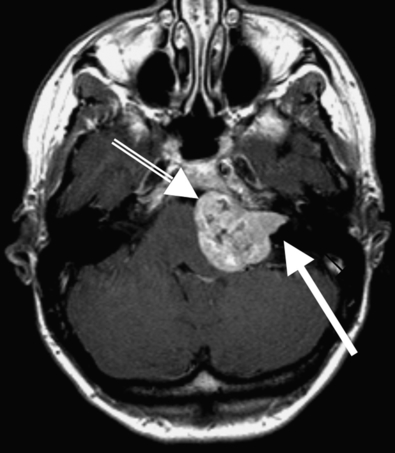Ear, Nose, and Throat Surgery
2 What are the other causes of lower motor neuron facial nerve paralysis?
 Herpes infection (Ramsay Hunt syndrome), which commonly involves the eighth nerve. Look for vesicles on the pinna and inside the ear; encephalitis or meningitis may be present.
Herpes infection (Ramsay Hunt syndrome), which commonly involves the eighth nerve. Look for vesicles on the pinna and inside the ear; encephalitis or meningitis may be present.
 Lyme disease (one of the most common causes of bilateral facial nerve palsy)
Lyme disease (one of the most common causes of bilateral facial nerve palsy)
 Middle ear or mastoid infection
Middle ear or mastoid infection
 Temporal bone fracture (look for Battle sign and/or bleeding from the ear)
Temporal bone fracture (look for Battle sign and/or bleeding from the ear)
 Tumor, classically an acoustic schwannoma (i.e., neuroma) of the cerebellopontine angle (Fig. 8-1)
Tumor, classically an acoustic schwannoma (i.e., neuroma) of the cerebellopontine angle (Fig. 8-1)

3 What are the common causes of hearing loss?
 Prolonged or intense exposure to loud noise (e.g., work-related).
Prolonged or intense exposure to loud noise (e.g., work-related).
 Congenital TORCH infection (toxoplasmosis, others, rubella, cytomegalovirus, herpes virus).
Congenital TORCH infection (toxoplasmosis, others, rubella, cytomegalovirus, herpes virus).
 Ménière disease (accompanied by severe vertigo, tinnitus, nausea and vomiting; treat acute episodes with benzodiazepines, anticholinergics [scopolamine], and antihistamines [meclizine or dimenhydrinate]; diuretics are often used for ongoing treatment; surgery may be used for refractory cases).
Ménière disease (accompanied by severe vertigo, tinnitus, nausea and vomiting; treat acute episodes with benzodiazepines, anticholinergics [scopolamine], and antihistamines [meclizine or dimenhydrinate]; diuretics are often used for ongoing treatment; surgery may be used for refractory cases).
 Drugs (e.g., aminoglycosides, aspirin, quinine, loop diuretics, cisplatin).
Drugs (e.g., aminoglycosides, aspirin, quinine, loop diuretics, cisplatin).
 Tumor (classically acoustic neuroma).
Tumor (classically acoustic neuroma).
 Labyrinthitis (may be viral or follow or extend from meningitis or otitis media).
Labyrinthitis (may be viral or follow or extend from meningitis or otitis media).
 Miscellaneous causes (diabetes, hypothyroidism, multiple sclerosis, sarcoidosis, pseudotumor cerebri).
Miscellaneous causes (diabetes, hypothyroidism, multiple sclerosis, sarcoidosis, pseudotumor cerebri).
Stay updated, free articles. Join our Telegram channel

Full access? Get Clinical Tree




